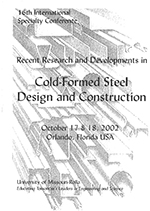Session Dates
17 Oct 2002
Abstract
Past research into the local buckling behaviour of fully profiled sandwich panels has been based on polyurethane foams and lower grade steels, and not for very slender plates. The Australian sandwich panels use polystyrene foam and thinner (0.42 mm) and high strength steels (G550 with a minimum yield stress of 550 MPa), which are bonded together using separate adhesives. Therefore a research project on Australian sandwich panels was undertaken using experimental and finite element analyses. The experimental study on 50 foam-supported plate elements and associated finite element analyses produced a large database for sandwich panels subject to local buckling effects, but revealed the inadequacy of conventional effective width formulae for panels with slender plates. It confirmed that these design rules could not be extended to the slender plates in their present form. In this research, experimental and analytical results were used to improve the design rules. This paper presents the details of experimental and finite element analyses, their results and the improved design rules.
Department(s)
Civil, Architectural and Environmental Engineering
Research Center/Lab(s)
Wei-Wen Yu Center for Cold-Formed Steel Structures
Meeting Name
16th International Specialty Conference on Cold-Formed Steel Structures
Publisher
University of Missouri--Rolla
Document Version
Final Version
Rights
© 2002 University of Missouri--Rolla, All rights reserved.
Document Type
Article - Conference proceedings
File Type
text
Language
English
Recommended Citation
Pokharel, Narayan and Mahendran, Mahen, "Some Improvements to the Design of Sandwich Panels Subject to Local Buckling Effects" (2002). CCFSS Proceedings of International Specialty Conference on Cold-Formed Steel Structures (1971 - 2018). 3.
https://scholarsmine.mst.edu/isccss/16iccfss/16iccfss-session9/3
Some Improvements to the Design of Sandwich Panels Subject to Local Buckling Effects
Past research into the local buckling behaviour of fully profiled sandwich panels has been based on polyurethane foams and lower grade steels, and not for very slender plates. The Australian sandwich panels use polystyrene foam and thinner (0.42 mm) and high strength steels (G550 with a minimum yield stress of 550 MPa), which are bonded together using separate adhesives. Therefore a research project on Australian sandwich panels was undertaken using experimental and finite element analyses. The experimental study on 50 foam-supported plate elements and associated finite element analyses produced a large database for sandwich panels subject to local buckling effects, but revealed the inadequacy of conventional effective width formulae for panels with slender plates. It confirmed that these design rules could not be extended to the slender plates in their present form. In this research, experimental and analytical results were used to improve the design rules. This paper presents the details of experimental and finite element analyses, their results and the improved design rules.



